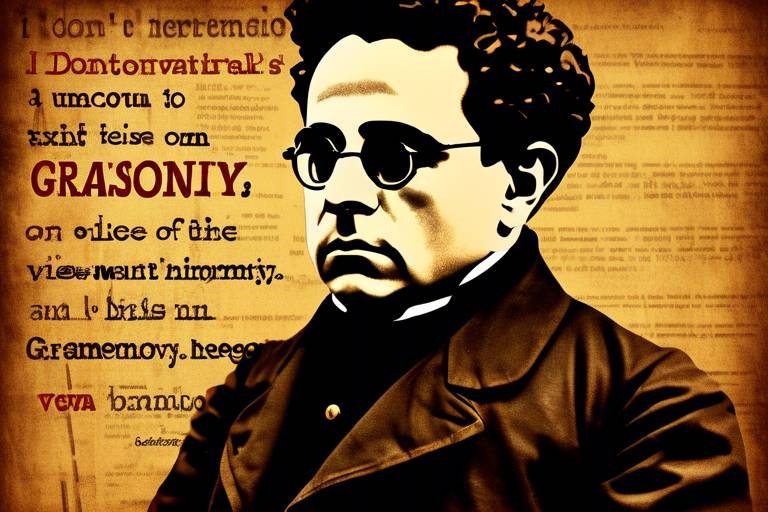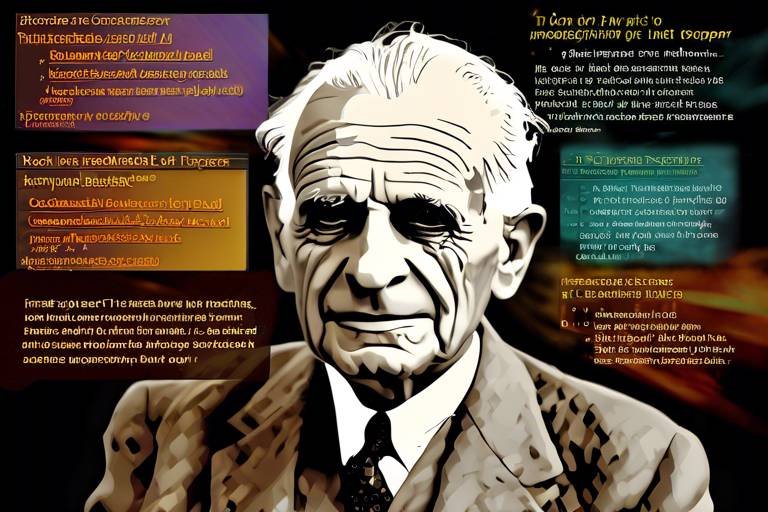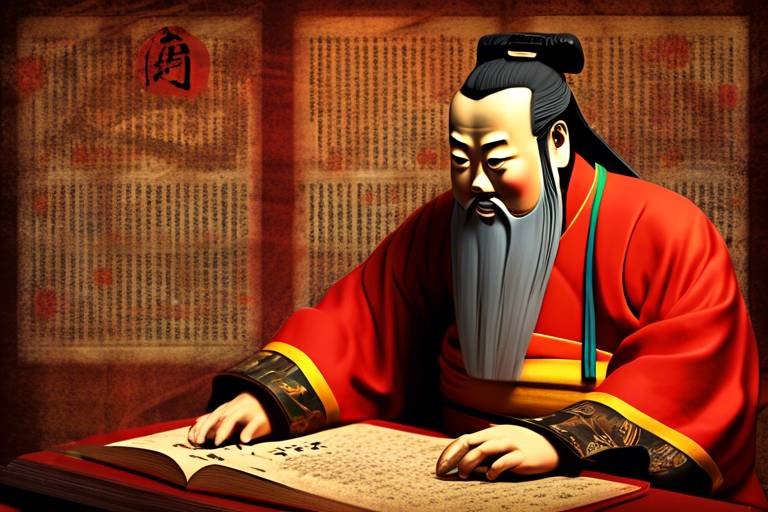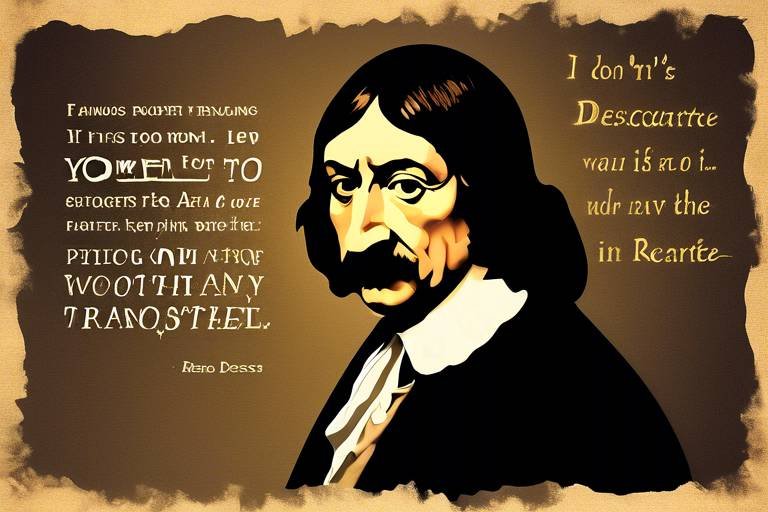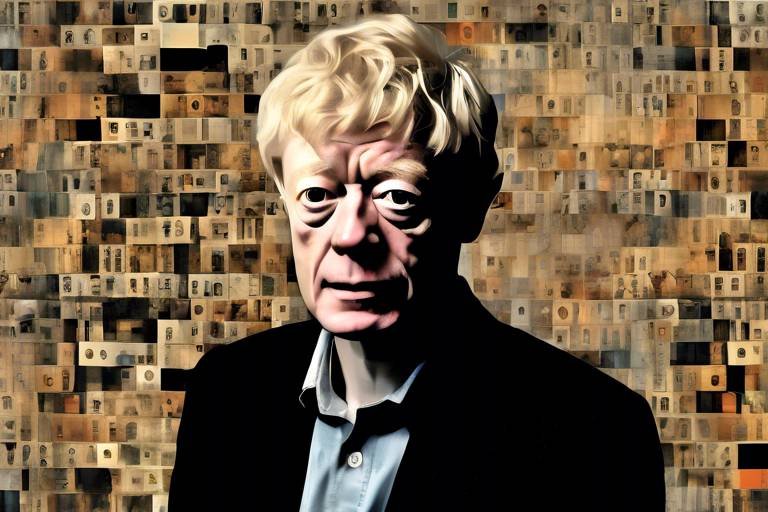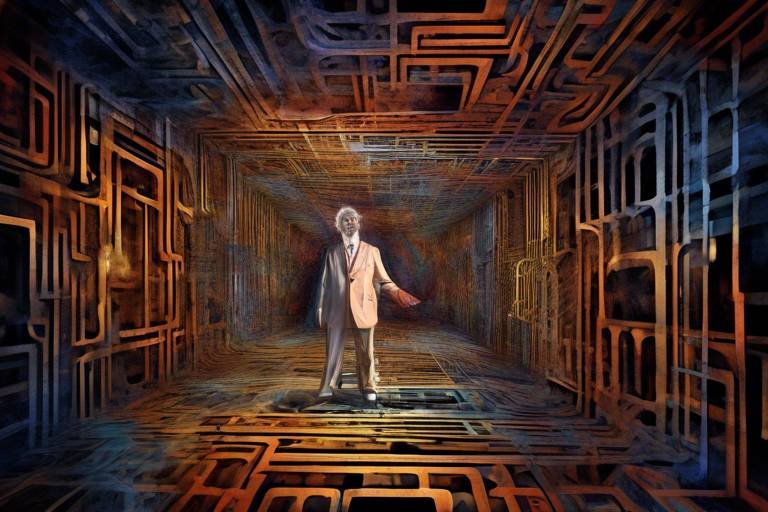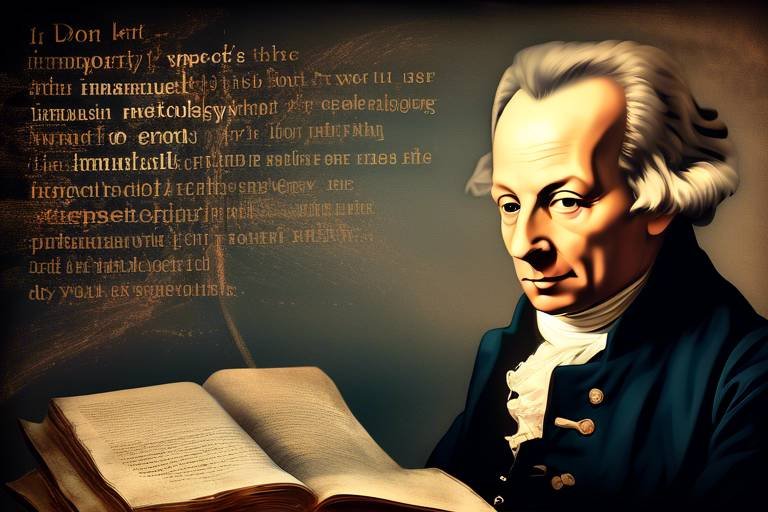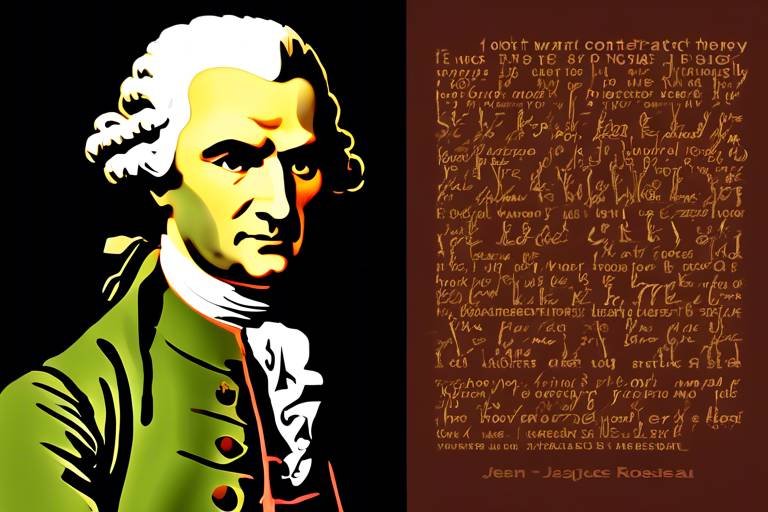Delving into Leo Strauss's Political Philosophy
When we think about political philosophy, names like Plato, Aristotle, and Machiavelli often come to mind. But what about Leo Strauss? A towering figure in 20th-century political thought, Strauss's work invites us to reexamine the very foundations of our political beliefs. His ideas are not just historical footnotes; they resonate with contemporary political discourse, challenging us to think critically about the world we live in. In this article, we'll embark on a journey through Strauss's political philosophy, exploring his interpretations of classical political theory, his critiques of modernity, and the implications of his thoughts for today's political landscape.
Strauss was not merely a scholar; he was a bridge between ancient wisdom and modern concerns. His emphasis on the importance of classical political philosophy serves as a reminder that the questions posed by the ancients are still relevant today. As we delve deeper into Strauss's thoughts, we will uncover the rich tapestry of influences that shaped his philosophy, from the classical thinkers of Greece to the modern ideologies that he critiqued. By understanding Strauss, we can gain valuable insights into the ongoing debates about morality, justice, and the role of the individual in society.
So, what makes Strauss's philosophy stand out? It’s his unique ability to intertwine the lessons of the past with the complexities of the present. He challenges us to confront uncomfortable truths and consider the implications of our beliefs. In a world often dominated by relativism and individualism, Strauss's call for a return to classical ideas provides a refreshing perspective that encourages deeper reflection on the nature of justice and the ideal state. As we explore his work, we will see how his critiques of modernity speak to the heart of contemporary political challenges.
Get ready to dive into the intriguing world of Leo Strauss, where ancient philosophies meet modern dilemmas. By the end of this exploration, you might find yourself questioning not just the political theories that shape our lives but also the very principles that guide our understanding of right and wrong. Are you prepared to challenge your preconceptions and engage with the profound ideas of one of the most influential political philosophers of our time?
- Who was Leo Strauss?
Leo Strauss was a political philosopher known for his work on classical political theory and his critiques of modern political thought, particularly liberalism and relativism.
- What is the significance of Strauss's critique of modernity?
Strauss's critique emphasizes the dangers of relativism and individualism in modern society, advocating for a return to classical philosophical principles that prioritize objective moral truths.
- How does Strauss interpret Plato's Allegory of the Cave?
Strauss sees the Allegory of the Cave as a metaphor for enlightenment and knowledge, illustrating the struggle to attain true understanding in a world filled with illusions.
- What role does esotericism play in Strauss's work?
Strauss believed that philosophers often wrote esoterically to protect their ideas from potential backlash, allowing deeper meanings to emerge for those who seek them.

The Roots of Strauss's Thought
To truly grasp the essence of Leo Strauss's political philosophy, one must embark on a journey through the historical and intellectual landscapes that shaped his ideas. Strauss, often regarded as a bridge between the ancient and modern worlds, drew inspiration from a plethora of classical philosophers while simultaneously critiquing the modern political landscape. His thoughts were profoundly influenced by the likes of Plato, Aristotle, and other ancient thinkers, who provided a foundation upon which he built his critique of contemporary ideologies.
Understanding these influences is akin to peeling back the layers of an onion; each layer reveals deeper insights into Strauss's philosophy. For instance, the classical tradition emphasized the pursuit of virtue and the common good, concepts that Strauss believed had been overshadowed by modernity's focus on individualism and relativism. He often lamented that modern thinkers had strayed too far from these foundational ideas, resulting in a political discourse that lacked depth and moral clarity.
Moreover, Strauss was not merely a passive observer of these traditions; he actively engaged with them, often challenging their interpretations. His work can be seen as a dialogue with the past, where he sought to uncover the timeless truths embedded in classical texts. This engagement is crucial because it highlights Strauss's belief that understanding the past is vital for addressing the challenges of the present. In this light, Strauss's philosophy serves as a reminder that the wisdom of ancient thinkers is not just relevant but essential for contemporary political thought.
In his writings, Strauss often emphasized the importance of philosophical inquiry and the need for a return to serious discussions about morality and ethics in politics. He argued that without a grounding in classical philosophy, modern political discourse risks becoming superficial and disconnected from the fundamental questions of human existence. This perspective invites us to reflect on our own political beliefs and the underlying principles that guide them.
As we delve deeper into Strauss's thought, it becomes evident that his critiques are not merely academic; they resonate with the political realities we face today. By examining the roots of his philosophy, we can better understand the implications of his work for contemporary political discourse and the ongoing struggle between individual rights and the common good.
In summary, the roots of Strauss's thought lie in a rich tapestry of classical philosophy interwoven with a critical examination of modernity. His insistence on returning to these foundational ideas challenges us to reconsider our political frameworks and engage with the moral dimensions of governance. As we explore the subsequent sections, we will uncover how Strauss's interpretations of Plato and Aristotle offer profound insights into justice, the ideal state, and the nature of human existence.

Classical Political Philosophy
Leo Strauss had a profound appreciation for , viewing it as a treasure trove of wisdom that holds the key to understanding the complexities of modern governance. He believed that the insights of ancient philosophers like Plato and Aristotle are not merely historical artifacts but are essential for grappling with contemporary political dilemmas. In a world where political discourse often feels fragmented and chaotic, Strauss urged a return to the foundational ideas that have shaped our understanding of justice, virtue, and the ideal state.
One of the most compelling aspects of Strauss's thought is his interpretation of Plato. He argued that Plato's works serve as a guide to understanding the nature of political life and the pursuit of the good. For Strauss, the dialogues of Plato are not just philosophical texts; they are a means of engaging with the most pressing questions of human existence. Through the lens of Plato, Strauss invites us to reconsider our own political beliefs and the foundations upon which they rest.
Similarly, Aristotle plays a crucial role in Strauss's exploration of classical political theory. Strauss admired Aristotle's empirical approach to politics, which emphasizes the importance of observing human behavior and societal structures. Aristotle's concept of human nature is particularly significant for Strauss, as it suggests that understanding the inherent qualities of human beings is essential for crafting effective political systems. By returning to these classical thinkers, Strauss believed that we could rediscover the enduring principles that guide ethical governance.
To illustrate the relevance of classical political philosophy in today's discourse, consider the following key themes that Strauss emphasized:
- The Nature of Justice: Strauss believed that classical thinkers provide a more profound understanding of justice than modern theorists, emphasizing the importance of virtue and the common good.
- Teleological Thinking: In contrast to modern political thought, which often prioritizes individual rights, Strauss advocated for a teleological approach that considers the ultimate purposes of political life.
- Community and Cohesion: Classical philosophy stresses the role of community in shaping individual identity and moral responsibility, a notion that Strauss felt was lacking in contemporary discussions.
In essence, Strauss's focus on classical political philosophy serves as a reminder that the questions we face today are not entirely new. By revisiting the thoughts of Plato and Aristotle, we can gain insights into our current political landscape and perhaps find solutions to the challenges that modernity presents. This exploration is not just an academic exercise; it is a call to action for anyone interested in the health of our political discourse.

Plato's Influence
When we talk about Leo Strauss and his political philosophy, we cannot overlook the profound influence of Plato. Strauss viewed Plato not just as a philosopher but as a critical thinker whose ideas resonate through the ages, shaping our understanding of politics, ethics, and the very nature of knowledge. For Strauss, Plato’s works serve as a lens through which we can evaluate modern political thought and its shortcomings. His interpretations of Plato often highlight a tension between idealism and reality, a theme that is especially pertinent in today’s political landscape.
One of the most significant aspects of Plato's influence on Strauss is the concept of the philosopher-king. This idea posits that the most knowledgeable individuals, those who truly understand the nature of justice and the good life, should govern society. Strauss admired this notion, arguing that modern democracies often overlook the necessity of wisdom in leadership. He believed that without wise rulers, societies risk falling into chaos and moral relativism. This brings us to the essential question: can a society flourish without leaders who possess deep philosophical insights?
Moreover, Strauss was captivated by the Allegory of the Cave, a central theme in Plato's "Republic." In this allegory, prisoners are confined in a cave, only able to see shadows cast on the wall, mistaking these illusions for reality. This powerful metaphor illustrates the journey from ignorance to enlightenment—a journey that Strauss believed was crucial for both individuals and societies. He argued that just as the philosopher must escape the cave to perceive true reality, so too must society strive for deeper understanding beyond mere appearances. The implications of this allegory are vast, suggesting that political engagement requires not just participation but a profound comprehension of truth and justice.
In addition, Strauss's interpretation of Plato’s ideas on justice and the ideal state is critical to understanding his critique of modernity. He often pointed to Plato’s vision of a just society, where the common good is prioritized over individual desires. This contrasts sharply with modern liberalism, which emphasizes personal freedom and individual rights. Strauss argued that without a shared understanding of justice, societies risk fragmenting into self-serving factions, each pursuing its own agenda at the expense of the collective.
In essence, Plato’s influence on Strauss is not merely academic; it is a call to action. It challenges us to reevaluate our political systems and the values that underpin them. As we navigate the complexities of contemporary politics, Strauss's insights remind us that the quest for truth and justice is not just a philosophical endeavor but a necessary condition for a thriving society. So, as we reflect on these teachings, we must ask ourselves: are we, like the prisoners in the cave, content with shadows, or are we willing to seek the light of true knowledge?
- What is the main idea behind Plato's Allegory of the Cave?
It illustrates the difference between the world of appearances and the world of reality, emphasizing the importance of enlightenment. - How does Strauss view modern political thought?
Strauss critiques modernity for its relativism and individualism, advocating a return to classical ideals. - Why is the philosopher-king concept important?
It suggests that knowledgeable and wise individuals should lead society to ensure justice and the common good.

The Allegory of the Cave
The Allegory of the Cave, a profound metaphor presented by Plato in his work "The Republic," serves as a crucial lens through which Leo Strauss interprets the nature of enlightenment and knowledge. Imagine a group of people who have been chained inside a dark cave their entire lives, facing a blank wall. The only reality they know comes from shadows cast by objects behind them, illuminated by a fire. These shadows represent the limited understanding of those who remain unexamined in their beliefs. For Strauss, this allegory is not just a philosophical exercise; it embodies the struggle between ignorance and enlightenment, a theme that resonates throughout his political thought.
Strauss argues that the journey out of the cave symbolizes the philosopher's quest for truth. When one of the prisoners is freed and exposed to the outside world, he initially experiences pain and confusion. This mirrors the discomfort that often accompanies the pursuit of deeper knowledge. Strauss emphasizes that true enlightenment requires a willingness to confront uncomfortable truths. The sun, representing the ultimate truth and the Form of the Good, is blinding at first, but it is essential for understanding the nature of reality. In this way, Strauss suggests that political philosophy must grapple with the tension between the familiar shadows of popular opinion and the harsh light of philosophical inquiry.
Moreover, the Allegory of the Cave has profound implications for political theory. Strauss posits that just as the prisoners in the cave are unaware of the true nature of their existence, so too are many citizens oblivious to the complexities of political life. This ignorance can lead to a complacent acceptance of the status quo, where individuals fail to question the principles that govern their society. Strauss warns that in a world dominated by relativism and liberalism, the challenge is to awaken individuals from their metaphorical slumber, encouraging them to seek knowledge and engage critically with their political environment.
Ultimately, the Allegory of the Cave serves as a reminder of the philosopher's role in society. Just as the freed prisoner returns to the cave to enlighten others, Strauss believes that philosophers have a duty to guide their fellow citizens toward a deeper understanding of justice and the ideal state. This allegorical journey from darkness to light underscores the importance of philosophical inquiry in fostering a more informed and engaged citizenry, capable of navigating the complexities of modern political discourse.
- What is the main message of the Allegory of the Cave?
The main message is that enlightenment and knowledge require a journey beyond the shadows of ignorance, challenging individuals to confront uncomfortable truths. - How does Strauss interpret the Allegory?
Strauss views it as a metaphor for the philosopher's quest for truth and the importance of critical thinking in political philosophy. - Why is the Allegory relevant today?
It highlights the need for individuals to question societal norms and engage deeply with political ideas, especially in a world rife with relativism.

Justice and the Ideal State
When we dive into Leo Strauss's interpretation of justice and the ideal state, we find ourselves navigating through a complex landscape that is rich with philosophical depth. Strauss, drawing heavily from Plato, posits that the concept of justice is not merely a set of rules or laws, but a profound understanding of the good life and the role of the state in achieving it. For Strauss, the ideal state is one that fosters a community where individuals can pursue virtue and excellence, rather than simply a mechanism for governance.
In his view, the ideal state must be grounded in a **teleological understanding** of human nature. This means that it should be oriented towards a specific purpose or end—namely, the cultivation of a good and just society. Strauss critiques modern political thought for often losing sight of these fundamental truths, arguing that contemporary theories tend to focus excessively on individual autonomy and rights, neglecting the communal aspects of justice.
To illustrate his point, Strauss often refers to the **"noble lie,"** a concept derived from Plato's *Republic*. This idea suggests that in order to maintain social harmony and encourage citizens to act for the common good, certain truths may need to be obscured. In a way, it highlights the tension between the philosopher's pursuit of truth and the politician's need for stability and order. The ideal state, according to Strauss, must balance these competing demands while still striving for a deeper understanding of justice.
Moreover, Strauss's exploration of justice is intricately linked to his critique of modernity. He believes that modern political ideologies, particularly liberalism, often dilute the concept of justice into mere **subjective preferences**. This relativistic approach undermines the possibility of a shared moral framework necessary for a cohesive society. In contrast, Strauss advocates for a return to classical ideas of justice that recognize an objective moral order, which is essential for the functioning of the ideal state.
In summary, Strauss's views on justice and the ideal state compel us to rethink our assumptions about politics and morality. They challenge us to consider how a society can be structured not just for the sake of order, but also for the flourishing of its citizens. As we reflect on these ideas, we might ask ourselves: What does it mean to live justly, and how can our political systems better reflect the pursuit of a common good?
- What is the significance of Plato's concept of justice in Strauss's philosophy?
Plato's concept of justice serves as a foundational element in Strauss's thought, emphasizing that justice is about the harmony of the whole community rather than merely individual rights. - How does Strauss's critique of modernity relate to his views on justice?
Strauss critiques modernity for promoting relativism and individualism, which he believes erode the communal understanding of justice necessary for a stable society. - What role does the "noble lie" play in Strauss's vision of the ideal state?
The "noble lie" illustrates the need for a shared moral narrative that can unify citizens and promote the common good, even if it requires the omission of certain truths.

Aristotle's Contributions
When diving into the depths of Leo Strauss's political philosophy, one cannot overlook the profound influence of Aristotle. Strauss regarded Aristotle as a cornerstone in the edifice of political thought, whose ideas continue to resonate through the ages. Aristotle's exploration of human nature, ethics, and politics provides a rich tapestry that Strauss weaves into his critique of modernity. Unlike Plato, who often emphasized ideal forms, Aristotle grounded his philosophy in the realities of human experience, making his insights particularly relevant for understanding the complexities of political life.
One of the most significant contributions of Aristotle that Strauss highlights is the concept of virtue ethics. Aristotle posited that the purpose of politics is to cultivate virtuous citizens, thereby fostering a just society. This idea stands in stark contrast to the modern emphasis on individual rights and personal freedom. For Strauss, Aristotle's vision of politics as a means to achieve the common good is a critical antidote to the fragmentation seen in contemporary political discourse. By prioritizing virtue, Aristotle challenges us to think about our roles not just as individuals, but as members of a larger community.
Moreover, Aristotle's notion of telos, or purpose, is pivotal in understanding his contributions to political philosophy. He believed that everything has an inherent purpose, including political institutions. This teleological perspective encourages a deeper inquiry into the objectives of our political systems. Strauss argues that modern political thought often neglects these essential purposes, leading to a disconnection between governance and the moral fabric of society.
In addition, Strauss draws attention to Aristotle's classifications of governments, which include monarchy, aristocracy, and polity, contrasted against their corrupt forms: tyranny, oligarchy, and democracy. This framework allows for a nuanced analysis of political systems, urging contemporary thinkers to reflect on the strengths and weaknesses of their own governance structures. By examining these classifications, Strauss illuminates how Aristotle's insights can guide us in evaluating the health of our political institutions today.
To further illustrate Aristotle's contributions, consider the following table that summarizes key aspects of his political philosophy:
| Concept | Description |
|---|---|
| Virtue Ethics | The idea that the purpose of politics is to cultivate virtuous citizens. |
| Telos | Every entity has a purpose, including political institutions. |
| Types of Government | Monarchy, Aristocracy, Polity vs. Tyranny, Oligarchy, Democracy. |
In conclusion, Aristotle's contributions to political philosophy are not just historical footnotes; they are vital to understanding the challenges we face in modern governance. Strauss's engagement with Aristotle serves as a reminder of the enduring relevance of classical thought in navigating the complexities of our contemporary world. By revisiting Aristotle's ideas, we can gain valuable insights into the nature of justice, the role of virtue, and the purpose of political institutions, ultimately guiding us toward a more cohesive and meaningful political discourse.
- What is the significance of Aristotle in Strauss's political philosophy?
Aristotle's emphasis on virtue ethics and the purpose of political institutions provides a foundation for Strauss's critique of modernity. - How does Aristotle's view of government differ from modern perspectives?
Aristotle categorizes governments based on their purpose and moral standing, contrasting with modern views that often prioritize individual rights. - Why is the concept of telos important in political philosophy?
Telos encourages a deeper understanding of the inherent purposes of political systems, which is often overlooked in contemporary political thought.

Critique of Modernity
Leo Strauss was not just a philosopher; he was a fierce critic of modern political thought. His critique primarily revolves around the ideas of liberalism and relativism, both of which he believed undermined the foundations of a cohesive society. To him, modernity represents a departure from the rich traditions of classical philosophy, leading to a fragmented understanding of human nature and political life. But what does this really mean for us today? Well, Strauss argued that the modern world, with its focus on individualism, often neglects the importance of communal values and shared moral frameworks.
One of the core issues Strauss identified within modern political thought is its embrace of liberalism. He viewed liberalism as a double-edged sword; while it champions individual freedom, it simultaneously fosters a sense of alienation among people. This alienation can lead to a breakdown in societal cohesion, as individuals become increasingly focused on personal desires rather than collective well-being. In his eyes, the emphasis on individual rights can create a society where people are more disconnected than ever, raising the question: can a society thrive when its members are primarily concerned with their own interests?
Moreover, Strauss's critique extends to the concept of relativism, which he believed poses significant challenges to political philosophy. Relativism suggests that moral truths are not absolute but rather vary based on cultural or individual perspectives. This idea, Strauss argued, leads to a dangerous moral ambiguity. Without a set of objective moral truths, how can we navigate the complexities of political life? Strauss was adamant that a return to classical ideas—those that emphasize universal truths—was essential for a healthy political discourse. He believed that without these guiding principles, society risks descending into chaos, where anything goes and nothing truly matters.
In his exploration of modernity, Strauss also highlighted the consequences of abandoning the philosophical rigor of classical thought. He believed that contemporary political discourse often lacks depth and clarity, which can lead to misguided policies and societal disarray. The challenge, he posited, is to find a balance between the valuable insights of modernity and the timeless wisdom of classical philosophy. This balance is crucial for fostering a political environment that encourages meaningful dialogue rather than divisive rhetoric.
To illustrate Strauss's critique of modernity further, consider the following table that summarizes his key arguments against liberalism and relativism:
| Concept | Critique |
|---|---|
| Liberalism | Promotes individualism at the expense of societal cohesion. |
| Relativism | Undermines the existence of objective moral truths, leading to moral ambiguity. |
In conclusion, Strauss's critique of modernity is not merely an academic exercise; it is a call to action. He urges us to reconsider the philosophical underpinnings of our political discourse and to recognize the importance of returning to classical ideas that emphasize virtue, community, and shared moral truths. As we navigate the complexities of contemporary politics, Strauss's insights remind us that understanding our philosophical roots is essential for forging a more cohesive and meaningful society.
- What is Leo Strauss's main critique of modernity? Strauss critiques modernity for its embrace of liberalism and relativism, which he believes undermines societal cohesion and objective moral truths.
- How does Strauss view liberalism? He sees liberalism as a double-edged sword that promotes individual freedom but can lead to alienation and a lack of community.
- What does Strauss propose as a solution? He advocates for a return to classical political philosophy, emphasizing the importance of universal moral truths and communal values.

Liberalism and Its Discontents
Liberalism, often hailed as the beacon of modern political thought, is not without its critics. Among them, Leo Strauss stands out as a formidable voice, challenging the very foundations of liberal ideology. Strauss argued that the rise of liberalism has led to a disintegration of the communal bonds that hold society together. In his view, the relentless pursuit of individualism, while empowering, ultimately undermines the collective good. This paradox creates a tension that is palpable in contemporary political discourse.
At the heart of Strauss's critique is the concern that liberalism, with its emphasis on personal freedom, fosters a sense of alienation among individuals. He believed that when people prioritize their own interests above the community, they risk losing the essential connections that define a healthy society. This notion can be illustrated through the metaphor of a tree: if each branch grows too far from the trunk, the tree may become unbalanced and eventually fall. In this analogy, the trunk represents the shared values and norms that bind individuals together.
Furthermore, Strauss highlighted the dangers of moral relativism that often accompany liberal thought. He argued that when individuals are free to define their own moral compass, it leads to a chaotic landscape where no single value can claim supremacy. This situation can be likened to a ship adrift at sea, lacking a clear destination or direction. The absence of a guiding moral framework can result in societal fragmentation, where conflicting beliefs clash without resolution.
To illustrate his point, Strauss often referred to the works of classical philosophers, emphasizing that they understood the importance of a shared moral foundation. Plato and Aristotle, for instance, posited that the ideal state is one where justice prevails, and citizens are united by common values. In stark contrast, Strauss viewed modern liberalism as a departure from these principles, leading to a society that is disconnected and discontented.
In essence, Strauss's critique of liberalism is not merely a rejection of individual freedom but an urgent call to reevaluate the balance between personal liberty and communal responsibility. He urges us to consider how we can foster a political environment that respects individual rights while also nurturing the bonds that unite us as a society. This delicate balance is crucial if we are to avoid the pitfalls of a fragmented and disenchanted populace.
In conclusion, Strauss's insights into the discontents of liberalism serve as a reminder that while the ideals of freedom and autonomy are essential, they must be tempered with a commitment to the common good. As we navigate the complexities of modern political life, his work encourages us to reflect on the values that truly matter and the role they play in shaping a cohesive and thriving society.

Relativism in Modern Thought
Relativism has become a dominant theme in contemporary philosophical discourse, often challenging the foundations of moral and political thought. Leo Strauss, a prominent figure in political philosophy, was acutely aware of the ramifications of this trend. He argued that relativism, which posits that truth and moral values are not absolute but rather contingent upon individual or cultural perspectives, poses significant challenges to the very fabric of societal cohesion and political discourse. In Strauss's view, this perspective undermines the quest for universal truths that can guide ethical behavior and governance.
To illustrate Strauss's concerns, consider how relativism manifests in various aspects of modern life:
- Moral Ambiguity: In a relativistic framework, actions that were once universally condemned can become acceptable based on cultural context. This raises questions about accountability and justice.
- Political Disengagement: When individuals believe that all viewpoints are equally valid, they may become apathetic, leading to a disengagement from political processes and civic responsibilities.
- Fragmentation of Society: Relativism can lead to a fragmented society where shared values erode, making it challenging to foster a sense of community or collective purpose.
Strauss's critique of relativism is not merely an academic exercise; it is a passionate call to recognize the dangers of abandoning objective moral truths. He contends that without a foundation of shared values, societies risk descending into chaos, where might makes right, and where the pursuit of power overshadows the pursuit of justice. This perspective is particularly relevant today, as we navigate a world increasingly defined by ideological divides and cultural clashes.
In grappling with the implications of relativism, Strauss advocates for a return to classical philosophical principles, which emphasize the existence of universal truths. He believed that philosophers have a responsibility to seek and articulate these truths, not just for the sake of intellectual rigor but for the sake of society itself. By doing so, they can help cultivate a more cohesive and just political landscape, one that recognizes the complexities of human nature while still striving for a common good.
Ultimately, Strauss's insights on relativism serve as a poignant reminder of the importance of grounding our political and moral discussions in something greater than individual opinion. They challenge us to consider how we can engage in meaningful dialogue that respects diverse perspectives while also seeking to uphold the values that sustain our communities. In a world rife with uncertainty, the pursuit of objective truths may be more crucial than ever.
- What is relativism in modern thought? Relativism is the idea that truth and moral values are not absolute but vary based on individual or cultural perspectives.
- Why did Leo Strauss critique relativism? Strauss believed that relativism undermines the quest for universal truths, which are essential for ethical behavior and societal cohesion.
- How does relativism affect political discourse? Relativism can lead to moral ambiguity, political disengagement, and societal fragmentation, making it difficult to foster shared values.
- What solutions does Strauss propose? Strauss advocates for a return to classical philosophical principles that emphasize the existence of objective moral truths to guide political and ethical discussions.

The Role of Esotericism
Esotericism, a concept often shrouded in mystery, plays a pivotal role in Leo Strauss's political philosophy. It refers to the idea that philosophers sometimes conceal their true thoughts and intentions beneath layers of meaning, a practice that serves multiple purposes. Why would someone choose to write in such a convoluted manner? The answer lies in the historical context in which Strauss and many of his philosophical predecessors operated. In a world where open criticism of prevailing political regimes could lead to dire consequences, veiling one's true beliefs became a necessary strategy for survival and influence.
Strauss believed that the act of writing esoterically was not merely a stylistic choice; rather, it was a profound philosophical tool. By embedding deeper meanings within seemingly straightforward texts, philosophers could engage in a dialogue with their readers that transcended the superficial. This method allowed them to communicate complex ideas without facing immediate backlash. For instance, when examining the works of classical thinkers like Plato and Aristotle, Strauss suggested that these philosophers often employed esoteric writing techniques to protect themselves from the wrath of political authorities while still imparting essential truths.
To illustrate this concept further, consider the following table that summarizes key elements of esotericism in Strauss's work:
| Element | Description |
|---|---|
| Concealment | Philosophers hide their true thoughts to avoid persecution. |
| Layered Meaning | Texts contain multiple interpretations, allowing for deeper engagement. |
| Dialogue with Readers | Encourages critical thinking and personal interpretation among readers. |
Understanding esotericism is crucial for grasping Strauss's critique of modern political discourse. In contemporary society, where political correctness often stifles genuine dialogue, Strauss's insights into esoteric writing can serve as a guide. They remind us that beneath the surface of political rhetoric, deeper truths may be lurking, waiting to be uncovered. By adopting a more nuanced approach to political texts, we can engage more thoughtfully with the ideas presented, fostering a richer political dialogue.
Moreover, Strauss's emphasis on esotericism challenges us to reconsider how we interpret not only philosophical texts but also the broader political narratives that shape our world. Are we merely accepting surface-level interpretations, or are we willing to delve deeper and explore the underlying motivations and beliefs of those who craft these narratives? As we navigate the complexities of modern political discourse, Strauss's call for a return to a more profound understanding of esotericism remains ever relevant.
- What is esotericism in political philosophy?
Esotericism refers to the practice of concealing one's true thoughts and intentions in writing, allowing for deeper engagement with complex ideas while protecting the author from potential backlash. - Why did Strauss believe esotericism was important?
Strauss believed that esotericism allowed philosophers to communicate essential truths without facing persecution, fostering a richer dialogue about political ideas. - How can understanding esotericism impact contemporary political discourse?
By recognizing the layers of meaning in political texts, we can engage more thoughtfully with the ideas presented and foster a more profound political dialogue.

Philosophical Writing Techniques
Leo Strauss's approach to writing is as intricate as the philosophical ideas he explores. His use of esoteric writing techniques is particularly noteworthy. Strauss believed that philosophers often needed to conceal their true thoughts to protect both themselves and their audiences. This approach was not merely a stylistic choice; it was a fundamental strategy to engage readers on multiple levels. When you delve into Strauss's texts, you might notice that he often wrote in a way that requires careful reading and interpretation. This is not accidental; it is a deliberate method aimed at provoking deeper thought.
One of the key techniques Strauss employed is the use of paradox and ambiguity. By presenting ideas that seem contradictory or unclear at first glance, he encourages readers to engage critically with the text. This technique serves a dual purpose: it protects the author from potential backlash while also inviting the reader to explore the nuances of the argument. For example, in his discussions of justice and the ideal state, Strauss often presents different interpretations of classical texts, leaving it up to the reader to draw conclusions. This creates an interactive experience, akin to a philosophical dialogue.
Moreover, Strauss's writing often reflects a deep respect for the historical context of philosophical ideas. He meticulously analyzes the works of classical philosophers, such as Plato and Aristotle, not just to critique them but to uncover the layers of meaning that have been obscured by modern interpretations. This contextual approach requires readers to consider the historical circumstances under which these ideas were conceived. By doing so, Strauss invites us to reflect on how the past informs contemporary political thought.
Additionally, Strauss's use of literary devices—such as allegory and metaphor—adds another layer of depth to his writing. For instance, he frequently employs allegorical references to engage the reader’s imagination and compel them to think beyond the surface. A prime example of this is how he interprets Plato's Allegory of the Cave, using it as a metaphor for enlightenment and the pursuit of knowledge. Through such techniques, Strauss not only conveys complex philosophical ideas but also makes them accessible and relatable.
In essence, Strauss's philosophical writing techniques are a form of art. They challenge readers to think critically, engage deeply, and appreciate the richness of philosophical discourse. By blending esotericism with a respect for historical context and employing literary devices, Strauss crafts a unique narrative that resonates with those willing to look beyond the obvious. His works remain a testament to the power of thoughtful writing in the realm of political philosophy, encouraging us to question, explore, and ultimately understand the intricate tapestry of human thought.
- What is esotericism in philosophical writing?
Esotericism refers to the practice of concealing deeper meanings within texts, allowing authors to express controversial ideas safely while inviting readers to engage critically with the content. - Why does Strauss critique modern political thought?
Strauss critiques modern political thought, particularly liberalism and relativism, because he believes they undermine the foundations of classical political philosophy and the pursuit of objective moral truths. - How can understanding Strauss's techniques enhance political discourse today?
By recognizing the nuances and deeper meanings in political discussions, we can foster more meaningful dialogues that transcend superficial disagreements and engage with the core ideas at play.

Implications for Political Discourse
The exploration of Leo Strauss's philosophy unveils profound implications for contemporary political discourse. In an era where political dialogue often devolves into sound bites and sensationalism, Strauss's emphasis on the importance of deeper understanding and the nuances of political thought is more relevant than ever. His work encourages us to look beyond the surface, urging us to engage with the underlying principles that shape our political beliefs and actions. This call for depth in political conversation can lead to more meaningful discussions, fostering an environment where ideas can be debated rather than dismissed.
One of the critical implications of Strauss’s philosophy is the recognition of esotericism in political writing. Strauss argued that many philosophers employed esoteric techniques to protect their ideas from misinterpretation or persecution. This insight prompts us to consider that not all political statements are straightforward; sometimes, they may conceal deeper meanings or critiques of prevailing ideologies. Understanding this can transform how we approach political texts and speeches, encouraging us to question and analyze rather than accept at face value.
Furthermore, Strauss's critique of modernity, particularly his concerns about relativism and its impact on moral discourse, challenges us to seek objective truths in our political conversations. In a world where opinions often clash, Strauss's advocacy for a return to classical ideas encourages us to ground our discussions in shared values and principles. This could mean revisiting timeless concepts of justice, virtue, and the common good, which can serve as a foundation for constructive dialogue.
Moreover, Strauss’s insights can help us navigate the complexities of modern political polarization. By recognizing the importance of classical political philosophy, we can foster a more inclusive discourse that transcends partisan divides. Engaging with the works of thinkers like Plato and Aristotle not only enriches our understanding but also provides a common language through which diverse perspectives can be articulated and understood.
To effectively implement these ideas in our political discussions, we can consider the following strategies:
- Encourage Critical Thinking: Foster an environment where questioning and critical analysis are valued over mere agreement.
- Promote Open Dialogue: Create spaces for respectful and open discussions that allow for differing viewpoints.
- Revisit Classical Texts: Engage with classical political philosophy to enrich our understanding and provide a solid foundation for contemporary issues.
In conclusion, the implications of Strauss's political philosophy extend far beyond academic circles. They challenge us to engage more thoughtfully in political discourse, emphasizing the need for depth, critical analysis, and a return to foundational principles. By embracing these ideas, we can aspire to a political dialogue that is not only more informed but also more constructive and enriching for all participants.
- What is Leo Strauss known for? Strauss is known for his work in political philosophy, particularly his interpretations of classical political thought and his critiques of modernity.
- How does Strauss view modern political thought? Strauss is critical of modern political thought, particularly liberalism and relativism, advocating for a return to classical ideas.
- What is esotericism in political writing? Esotericism refers to the practice of concealing deeper meanings in philosophical texts to protect the author’s ideas and provoke critical thought among readers.
- Why are classical philosophers important today? Classical philosophers provide timeless insights into human nature, justice, and governance that can inform and enrich contemporary political discourse.
Frequently Asked Questions
- What are the main influences on Leo Strauss's political philosophy?
Strauss's political philosophy is deeply rooted in classical political thought, particularly the ideas of philosophers like Plato and Aristotle. He believed that understanding these classical foundations is essential for critiquing modern political theories. By exploring the works of these thinkers, Strauss aimed to uncover timeless truths about human nature and governance.
- How does Strauss interpret Plato's Allegory of the Cave?
The Allegory of the Cave is pivotal in Strauss's thought as it symbolizes the journey from ignorance to enlightenment. Strauss interprets this allegory as a metaphor for the philosopher's role in society—illuminating the truth for those still trapped in the shadows of illusion. He argues that this allegory underscores the importance of knowledge in achieving a just society.
- What is Strauss's critique of modern liberalism?
Strauss critiques modern liberalism for fostering individualism at the expense of societal cohesion. He argues that this focus on personal freedom can lead to fragmentation within society, undermining the communal values that are essential for a stable political order. For Strauss, a return to classical ideas is necessary to counteract these discontents.
- What does Strauss mean by relativism in modern thought?
Strauss identifies relativism as a major challenge to political philosophy, arguing that it denies the existence of objective moral truths. He believes that this perspective weakens the foundations of political discourse and undermines the pursuit of justice. By advocating for a return to classical philosophy, Strauss seeks to re-establish these objective standards.
- What role does esotericism play in Strauss's writings?
Esotericism is a significant theme in Strauss's work; he posits that philosophers often write in a way that conceals their true thoughts to protect themselves and their audiences. This technique allows for deeper engagement with philosophical ideas, encouraging readers to think critically and uncover hidden meanings. Strauss believed this approach was essential for understanding the complexities of political philosophy.
- How can Strauss's insights inform contemporary political discourse?
Understanding Strauss's ideas about esotericism and classical political philosophy can greatly enhance contemporary political dialogue. By recognizing the deeper meanings behind political texts and discussions, individuals can engage more thoughtfully with differing viewpoints, fostering a more nuanced and productive discourse in today's complex political landscape.


